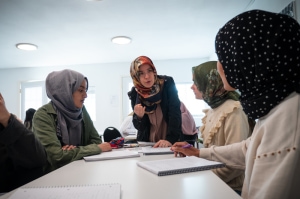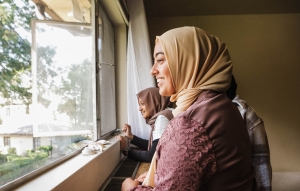Experiential Learning
What is Experiential Learning?
Zaytuna College aims to foster a holistic environment of learning where inquiry, transmission, and debate take place as a way of life inside and outside the classroom. The College also organizes a wide range of public events on social, political, and religious topics each semester, often collaborating with schools and centers from neighboring institutions, such as the Graduate Theological Union and the University of California, Berkeley. Some of these events, sponsored by Zaytuna’s journal, Renovatio, bring Muslim scholars and leaders into conversation with each other, as well as with intellectuals and activists of different faiths and perspectives, to address and contend with today’s most pressing societal and moral issues.
Students also engage in a structured learning activity outside the classroom through an experiential learning program. Faculty advisors are available to advise students as they advance through the program, to discuss and help overcome challenges, and to guide and counsel their career aspirations. Faculty and students work closely to facilitate an integrated learning environment where every conversation becomes a class, and every class an adventure.
Sunnah Sports
The tradition of sunnah sports is based on the saying of the Prophet s, who is reported to have said, “Teach your children swimming and archery,” and ¢Umar b. al-Khaţţāb’s statement “Teach your children swimming, archery, and horse riding.” To revive the tradition, Zaytuna College includes swimming, archery, and horseback riding in its curriculum. Student cohorts take swimming, archery, and horseback riding in their freshman, sophomore, and junior years, respectively.
The principles of a liberal arts education create a foundation that emphasizes interdisciplinary study. To be liberally educated is to be personally transformed by an integrated curriculum that over time unifies the student’s body, mind, and soul. Liberal education is the cultivation of wisdom and virtues, and of habits that are the result of deliberate, focused, and disciplined effort. The College’s sunnah sports curriculum aspires to cultivate comparable virtues in an athletic setting, thus thoroughly integrating the spiritual development of the body with the spiritual development of the mind.
Swimming presents an environment in which students learn to overcome fears, such as fear of bodily harm, fear of failure, and fear of pushing one’s body beyond its capacity. Therefore, completing the swimming requirement builds courage and develops resilience in students. Archery compels an inner struggle with the self to reach one’s target, despite distractions and preoccupations. Therefore, to be successful in archery, students must demonstrate temperance, which leads to inner stillness and sharp focus. Horseback riding presents the challenge of working with another living being that has its own will and intelligence. Therefore, horseback riding teaches students how to regulate relationships with others, to be fair and just in their interactions, and to respect all of God’s creatures.
To achieve these goals, the College initiated its Sunnah Sports Program in 2017. The program is an integral part of the curriculum, and all students must meet the requirements for a degree to be issued. Students are offered the opportunity to test out of participating if they can pass the minimum requirements within the first two weeks of the semester. Participation in each sport is for both semesters of each school year.
Every freshman at Zaytuna College—unless medically excused—must achieve a level of proficiency in swimming. Swimming classes are an hour long and are held once a week for each gender.
Goals
All Zaytuna College students must learn to swim continuously for three hundred yards, using a combination of freestyle (with side breathing and a strong kick) and one other competitive stroke (butterfly, breaststroke, or backstroke), with correct coordination and satisfactory power. Students must also be able to tread water continuously for two minutes.
Every sophomore at Zaytuna College—unless medically excused—must achieve a level of proficiency in archery. Archery classes are sixty or ninety minutes long and are held at the upper campus once a week. Students receive instruction from an exerienced instructor, certified with the USA Archery organization.
Goals
Archery students must successfully demonstrate the following a number of competencies during the course of their training. These competencies include a working knowledge of range safety, all parts of a recurve and compound bow, and of an arrow. Technical skills include the methodology to string and de-string a recurve bow and how to score an end using a 40 cm face target. Finally, shooting requirements include the ability to acheive a minimum score of 24 on a 40 cm target from a distance of 18 meters.
Every member of the junior cohort at Zaytuna College—unless medically excused—must achieve a level of proficiency in horseback riding. Horseback riding classes are one hour long and are held at Kismet Farms in Martinez, CA, twice a week. The College has exclusive access to facilities during class time, and male and female students receive instruction in a group setting.
Goals
Students learn how to properly handle, move around, and lead a horse; groom the horse with proper tools; and care for the equipment. Students must also learn blanket and stall safety, how to mount and dismount, and how to use the bridle and saddle (supervised with minimal assistance), as well as learn positioning (hands, seat, legs, eyes, and balance), control (steering through obstacles, halting, backing, and basic patterns), and pace (lengthening, collecting, and working at the trot).
Community Service and Civic Engagement
Experiential learning through community service and civic engagement is integral to the Zaytuna College undergraduate program. Students gain real-world experience by engaging with the broader community through service or civic projects. The projects may be in the community during the academic year or through extended field trips in the winter, spring, or summer breaks. Students are expected to connect these experiences to what they learn inside the classroom and to their efforts toward spiritual and moral growth.
Every Zaytuna student must perform at least fifty hours of community service or civic engagement, which is approved and evaluated by a member of the faculty, in order to graduate.
Active reflection, prompted by short writing assignments and guided discussions, encourages students to think systematically and creatively about the complex issues related to their chosen community projects. Through their reflections, students begin to understand the wider community, acquire empathy for others, seek solutions to societal problems, and examine their own perspectives in relation to those of others.
Through written and oral assignments, students learn to communicate the valuable lessons learned through their experiences, how these lessons relate to their coursework, and how service is essential to building healthier communities. A final reflection paper captures the sum of the experience and is read by a faculty committee.
Completion Timeline
Students are encouraged to complete this fifty-hour requirement by the end of their junior year. Students who need to extend the deadline for the experiential learning reflection paper into their senior year must have prior permission from the coordinator of Experiential Learning. Although all fifty hours of experiential learning may be completed in one semester, it is wise for students to pace themselves by completing some hours each semester, starting in the freshman year, so the graduation requirements do not become unmanageable toward the end of the program.
Explore the BA Program
BA Courses
Read course descriptions for the 4-year undergraduate program.
Preceptorials
An opportunity for advanced study with Zaytuna Faculty.
BA FAQs
Common questions for prospective students and parents.



